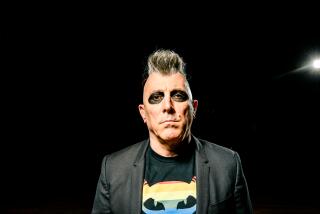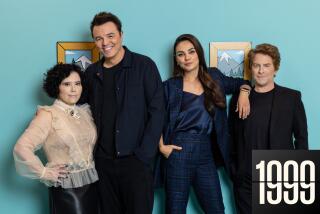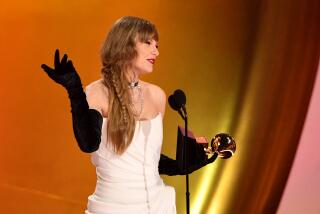Review: L.A. Master Chorale finale time-warps from 17th century to ‘Space Odyssey’ to Depeche Mode
György Ligeti’s “Lux Aeterna” is likely to stand out in any program devoted solely to the art of choral music. “If you can remember it through the haze of the ‘60s,” conductor Grant Gershon reminded the audience at the Los Angeles Master Chorale’s season finale, you’ll recall the supernatural-sounding music underscored the appearance of the mysterious monolith in Stanley Kubrick’s “2001: A Space Odyssey.”
On Sunday, Ligeti’s score was part of the master chorale’s refreshingly rich and varied Walt Disney Concert Hall program, which offered a baker’s dozen of a cappella choral works and called upon three conductors to lead them.
Gershon, the artistic director, proved a masterful guide through the first four pieces, which began with the sumptuous sonorities of Antonio Lotti’s “Crucifixus” and, astonishingly, the master chorale’s first performance of Gregorio Allegri’s famous “Miserere,” a 17th century setting of Psalm 51. The chorus’ magisterial rendition alternated between the main choir and an octet standing on an upper level, one of the singers perched above stage right lofting an otherworldly high C before the two groups came together seamlessly at the end.
Gershon told the audience that “Miserere” was jealously guarded by the Vatican for exclusive use in the Sistine Chapel for more than two centuries. But when the 14-year-old Mozart heard the music during a visit to Rome in 1770, he wrote the piece down from memory. Instead of being excommunicated, Mozart was rewarded by an impressed Pope Clement XIV. It was, Gershon joked, “like Mozart punked the pope.”
In “Envoi,” a tone poem for mixed a cappella chorus by Abbie Betinis (born 1980), Gershon and the master chorale conjured the sound of a mass of butterflies in flight through expert articulation of nonsense syllables.
Though the ensemble performed Ligeti’s “Lux Aeterna” accompanying a live screening of “2001” last August at the Hollywood Bowl, here Gershon could observe the composer’s concluding seven bars of silence, which positively vibrated in Disney Hall.
In memory of composer Steven Stucky, who died in February, associate conductor Lesley Leighton led the master chorale in ravishing accounts of his “Three New Motets” (2006), which the group first performed in 2008. Leighton, who is exiting her post after a six-year tenure, told the audience she’ll probably remember most fondly her earlier years “singing in the ranks” of the master chorale. “There’s nothing more special than that,” she said.
After intermission Eric Whitacre, who will begin a two-year appointment next season as the master chorale’s first artist in residence, took the podium. A youthful-looking 46, Whitacre thanked Gershon for “letting me drive your Ferrari for a couple of numbers” and also joked that he once wanted to be “the fifth member of Depeche Mode.” After leading the master chorale in his poetic arrangement of English synthpop band’s song “Enjoy the Silence,” Whitacre turned to Swedish composer Anders Hillborg’s enveloping “Mouyayoum,” generating organ- and synthesizer-like sonorities intended to evoke the aurora borealis.
Gershon returned to conduct the intimate “Mi lumía” by Argentine composer Javier Zentner (born 1951) and the touching “Au-Delà Du Chagrin” (“Beyond Sorrow”) by American composer Sydney Guillaume (born 1982). The master chorale’s stirring rendition of the traditional spiritual “Elijah Rock” summoned a well-deserved, rousing ovation.
For an encore, Whitacre conducted the premiere of his setting of e.e. cumming’s poem “[i carry your heart with me (i carry it in],” seductively rendered by the chorus.
Follow The Times’ arts team @culturemonster.
More to Read
The biggest entertainment stories
Get our big stories about Hollywood, film, television, music, arts, culture and more right in your inbox as soon as they publish.
You may occasionally receive promotional content from the Los Angeles Times.






